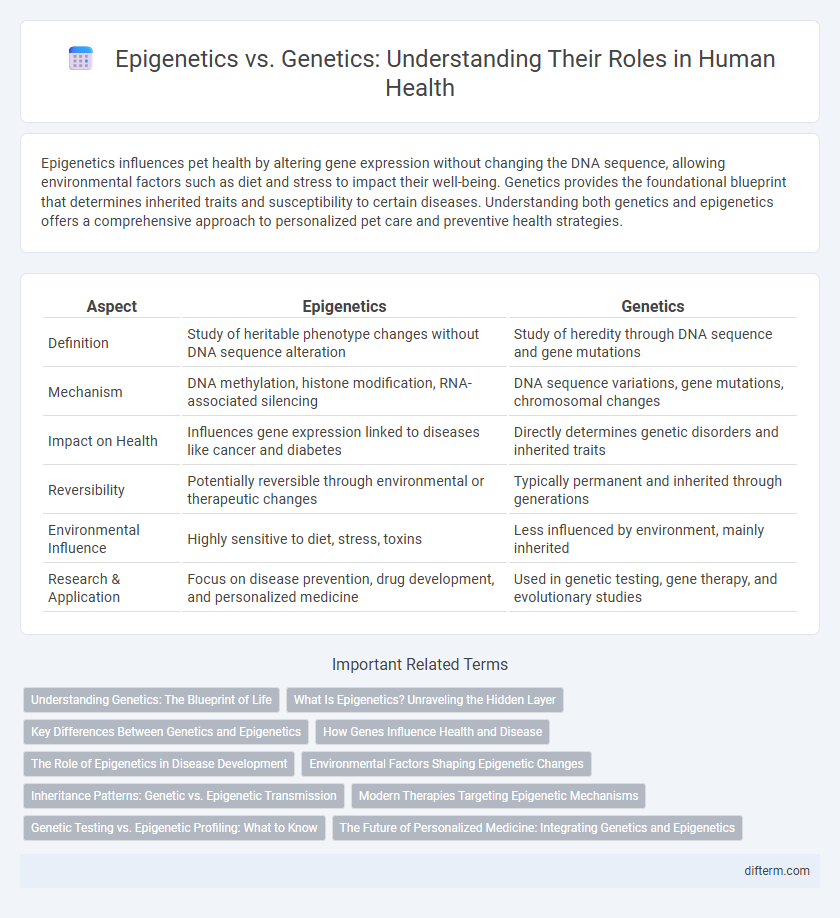Epigenetics influences pet health by altering gene expression without changing the DNA sequence, allowing environmental factors such as diet and stress to impact their well-being. Genetics provides the foundational blueprint that determines inherited traits and susceptibility to certain diseases. Understanding both genetics and epigenetics offers a comprehensive approach to personalized pet care and preventive health strategies.
Table of Comparison
| Aspect | Epigenetics | Genetics |
|---|---|---|
| Definition | Study of heritable phenotype changes without DNA sequence alteration | Study of heredity through DNA sequence and gene mutations |
| Mechanism | DNA methylation, histone modification, RNA-associated silencing | DNA sequence variations, gene mutations, chromosomal changes |
| Impact on Health | Influences gene expression linked to diseases like cancer and diabetes | Directly determines genetic disorders and inherited traits |
| Reversibility | Potentially reversible through environmental or therapeutic changes | Typically permanent and inherited through generations |
| Environmental Influence | Highly sensitive to diet, stress, toxins | Less influenced by environment, mainly inherited |
| Research & Application | Focus on disease prevention, drug development, and personalized medicine | Used in genetic testing, gene therapy, and evolutionary studies |
Understanding Genetics: The Blueprint of Life
Genetics is the study of DNA sequences that serve as the blueprint for inherited traits and biological functions. This genetic code determines how cells develop, how proteins are made, and how organisms grow and function throughout life. Understanding genetics provides critical insights into the mechanisms of hereditary diseases and the basis of individual health variations.
What Is Epigenetics? Unraveling the Hidden Layer
Epigenetics involves heritable changes in gene expression that do not alter the underlying DNA sequence, enabling environmental factors to influence how genes are turned on or off. Unlike genetics, which focuses on the fixed sequence of nucleotides, epigenetics explores modifications such as DNA methylation and histone modification that regulate gene activity dynamically. Understanding epigenetic mechanisms reveals how lifestyle, diet, and exposure to toxins contribute to health outcomes and disease susceptibility beyond genetic predisposition.
Key Differences Between Genetics and Epigenetics
Genetics involves the study of DNA sequences and inherited traits encoded within the genome, determining an organism's fundamental biological blueprint. Epigenetics examines modifications such as DNA methylation and histone acetylation that regulate gene expression without altering the underlying DNA sequence. These epigenetic changes can be influenced by environmental factors and are often reversible, differentiating them from the fixed nature of genetic mutations.
How Genes Influence Health and Disease
Genes play a fundamental role in determining an individual's susceptibility to various diseases by encoding proteins that regulate physiological processes and cellular functions. Epigenetics modifies gene expression without altering the DNA sequence, influencing how genes associated with health and disease are activated or silenced in response to environmental factors. This dynamic interplay between genetic predisposition and epigenetic modifications ultimately shapes disease risk, progression, and overall health outcomes.
The Role of Epigenetics in Disease Development
Epigenetics involves modifications in gene expression without altering the DNA sequence, playing a crucial role in disease development by regulating how genes respond to environmental factors such as diet, stress, and toxins. Unlike genetics, which deals with inherited DNA sequences, epigenetic changes are often reversible and can influence the progression of diseases like cancer, diabetes, and neurological disorders. Research on epigenetic markers such as DNA methylation and histone modification has advanced personalized medicine approaches by identifying targets for early intervention and therapy.
Environmental Factors Shaping Epigenetic Changes
Environmental factors such as diet, stress, and exposure to toxins play a crucial role in shaping epigenetic changes by altering gene expression without modifying the DNA sequence. These epigenetic modifications, including DNA methylation and histone acetylation, can influence susceptibility to diseases like cancer, diabetes, and mental health disorders. Unlike genetic mutations, epigenetic changes are reversible, offering potential avenues for therapeutic interventions that target environmental influences on gene regulation.
Inheritance Patterns: Genetic vs. Epigenetic Transmission
Genetic inheritance involves the transmission of DNA sequences from parents to offspring, determining traits through stable, sequence-based information. Epigenetic inheritance refers to heritable modifications, such as DNA methylation and histone acetylation, that regulate gene expression without altering the DNA code itself. These epigenetic marks can be influenced by environmental factors and may be reversible, creating additional layers of biological complexity beyond traditional genetic inheritance.
Modern Therapies Targeting Epigenetic Mechanisms
Modern therapies targeting epigenetic mechanisms focus on modifying gene expression without altering the DNA sequence through drugs like DNA methyltransferase inhibitors and histone deacetylase inhibitors. These epigenetic drugs offer promising treatment options for cancer, neurological disorders, and autoimmune diseases by reversing abnormal gene silencing or activation. Epigenetic therapies complement traditional genetic treatments by addressing reversible molecular changes, enabling more precise and personalized medical interventions.
Genetic Testing vs. Epigenetic Profiling: What to Know
Genetic testing analyzes DNA sequences to identify inherited mutations linked to diseases, providing insights into an individual's susceptibility to certain conditions. Epigenetic profiling examines chemical modifications on genes that regulate gene expression without altering the DNA sequence, revealing how environmental factors impact health. Understanding the differences between genetic testing and epigenetic profiling helps tailor personalized treatment plans and preventive strategies based on both inherited and lifestyle-influenced factors.
The Future of Personalized Medicine: Integrating Genetics and Epigenetics
The future of personalized medicine hinges on integrating genetics and epigenetics to develop tailored treatments that account for both inherited DNA sequences and dynamic gene expression changes influenced by the environment. Advances in high-throughput sequencing and epigenomic profiling enable precise identification of biomarkers that predict disease susceptibility, drug response, and therapeutic outcomes. Combining genomic and epigenomic data facilitates more accurate risk assessment and individualized interventions, revolutionizing disease prevention and management strategies.
Epigenetics vs Genetics Infographic

 difterm.com
difterm.com